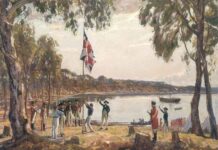 Originally published May 21, 2018.
Originally published May 21, 2018.
My attention has been drawn recently to an article by Winston Churchill, the Winston Churchill, published on February 8, 1920 in the Illustrated Sunday Herald (London), titled Zionism vs Bolshevism: A struggle for the soul of the Jewish people.
Given that this was written by Winston Churchill, the thoughts are very much unfiltered. Given that they were written before the holocaust and are therefore not restricted by sensibilities which have become the norm since the holocaust regarding the role of Jews in Western public life, the thoughts are doubly unfiltered. Given the events which occurred in the decades after this article were written, events which have shaped the nature of the modern world, the thoughts are prescient.
Churchill makes a case that there exist three classes of Jews: ordinary Jews who want to earn a living, raise a family and contribute to the nation they live in; Jews who work to undermine the nations of the West via socialism; and Jews who want to create a national homeland for Jews in Israel. It is a distinction similar to the those we make today between ordinary Muslims, “extremist” or “purist” Muslims, and reformist Muslims. It is also worth keeping in mind considering the arrest of Paul Weston in 2014 after a public speech in which he quoted Winston Churchill’s observations of Muslims. No doubt a reading of this article may also land one in trouble with the British authorities.
Below are some choice excerpts:
“SOME people like Jews and some do not; but no thoughtful man can doubt the fact that they are beyond all question the most formidable and the most remarkable race which has ever appeared in the world.”
Churchill clearly has respect for Jews, but he acknowledges that with great power comes great responsibility:
“The conflict between good and evil which proceeds unceasingly in the breast of man nowhere reaches such an intensity as in the Jewish race. The dual nature of mankind is nowhere more strongly or more terribly exemplified.”
He thus attributes to Jews the two most powerful systems of thought in the West – Christianity on the one hand and socialism on the other. Churchill then takes a very civnat line toward those whom he categorises as “National Jews”:
“There are the Jews who, dwelling in every country throughout the world, identify themselves with that country, enter into its national life, and, while adhering faithfully to their own religion, regard themselves as citizens in the fullest sense of the State which has received them. Such a Jew living in England would say, “I am an Englishman practising the Jewish faith.” This is a worthy conception, and useful in the highest degree.”
But he contrasts this with those in whom a beastly ideology has laid root:
“In violent opposition to all this sphere of Jewish effort rise the schemes of the International Jews. The adherents of this sinister confederacy are mostly men reared up among the unhappy populations of countries where Jews are persecuted on account of their race. Most, if not all, of them have forsaken the faith of their forefathers, and divorced from their minds all spiritual hopes of the next world. This movement among the Jews is not new. From the days of Spartacus-Weishaupt to those of Karl Marx, and down to Trotsky (Russia), Bela Kun (Hungary), Rosa Luxembourg (Germany), and Emma Goldman (United States), this world-wide conspiracy for the overthrow of civilisation and for the reconstitution of society on the basis of arrested development, of envious malevolence, and impossible equality, has been steadily growing. It played, as a modern writer, Mrs. Webster, has so ably shown, a definitely recognisable part in the tragedy of the French Revolution. It has been the mainspring of every subversive movement during the Nineteenth Century; and now at last this band of extraordinary personalities from the underworld of the great cities of Europe and America have gripped the Russian people by the hair of their heads and have become practically the undisputed masters of that enormous empire.”
He then labels them “terrorists” and apportions much of the blame to them for the Russian Revolution:
“There is no need to exaggerate the part played in the creation of Bolshevism and in the actual bringing about of the Russian Revolution by these international and for the most part atheistical Jews. It is certainly a very great one; it probably outweighs all others.”
Much of Churchill’s writings of the interwar years appear prophetic, no more so than the following paragraph in which he fears for the millions of innocents who may suffer due to this association:
“The fact that in many cases Jewish interests and Jewish places of worship are excepted by the Bolsheviks from their universal hostility has tended more and more to associate the Jewish race in Russia with the villainies which are now being perpetrated. This is an injustice on millions of helpless people, most of whom are themselves sufferers from the revolutionary regime. It becomes, therefore, specially important to foster and develop any strongly-marked Jewish movement which leads directly away from these fatal associations. And it is here that Zionism has such a deep significance for the whole world at the present time.”
He thus identifies a solution and a way forward in the idea of a Jewish State in Israel:
“Zionism offers the third sphere to the political conceptions of the Jewish race. In violent contrast to international communism, it presents to the Jew a national idea of a commanding character.
He sees the creation of the State of Israel as being in the interests of the British Empire:
“Of course, Palestine is far too small to accommodate more than a fraction of the Jewish race, nor do the majority of national Jews wish to go there. But if, as may well happen, there should be created in our own lifetime by the banks of the Jordan a Jewish State under the protection of the British Crown, which might comprise three or four millions of Jews, an event would have occurred in the history of the world which would, from every point of view, be beneficial, and would be especially in harmony with the truest interests of the British Empire.”
And such a creation as an antidote to Bolshevism and a vindication of the Jewish people:
“It is particularly important in these circumstances that the national Jews in every country who are loyal to the land of their adoption should come forward on every occasion, as many of them in England have already done, and take a prominent part in every measure for combating the Bolshevik conspiracy. In this way they will be able to vindicate the honour of the Jewish name and make it clear to all the world that the Bolshevik movement is not a Jewish movement, but is repudiated vehemently by the great mass of the Jewish race.”
—
I will leave my own commentary sparse, limited to encouraging debate on the following questions:
- Is the association Churchill makes between Jews and socialism fair?
- Does this suggest that the actions of Jewish people can affect how they are treated in their host nations, good or bad?
- Can Israel be blamed for current conflict in the Middle East, which surely would have been a powderkeg regardless in the wake of the collapse of the Ottoman Empire?
- Why did the Europeans not simply re-establish either the Crusader States of the Middle Ages or the old Roman/Byzantine territories in the Middle East?
This list is far from comprehensive. As ever, The XYZ looks to encourage constructive dialogue free of reflexive charges of antisemitism.
Photo by Tiocfaidh ár lá 1916 







